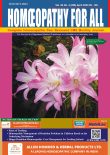Exploring Diverse Career Options with PhD after Homeopathy
Keywords:
knowledge, immense, homeopathyAbstract
The field of homeopathy has long been regarded as a holistic and alternative approach to healthcare, focusing on the individual as a whole rather than simply treating symptoms. Homeopathic physicians possess a deep understanding of the intricate dynamics between the human body, mind, and spirit, and their expertise in this domain serves as a strong foundation for further academic pursuits. While a career in homeopathy offers immense opportunities for personal and professional growth, many individuals with a background in homeopathy are now considering the option of pursuing a PhD in various subjects, differing from the core subjects of the field, to complement their existing knowledge.
Downloads
References
Chikramane, Prashant Satish, et al. "Extreme homeopathic dilutions retain starting materials: A nanoparticulate perspective." Homeopathy 99.04(2010):231-242.
Ullman, Dana. "Luc Montagnier, Nobel Prize Winner, Takes Homeopathy Seriously." (2015).
Heinrich, M., & Barnes, J. (Eds.). (2012). Fundamentals of Pharmacognosy and Phytotherapy (2nd ed.). Churchill Livingstone.
Purves, D., Augustine, G. J., Fitzpatrick, D., Hall, W. C., LaMantia, A. S., McNamara, J. O., & White, L. E. (Eds.). (2018). Neuroscience (6th ed.). Sinauer Associates.
Erickson, K. I., Creswell, J. D., Verstynen, T. D., & Gianaros, P. J. (2014). Health Neuroscience: Defining a New Field. Current directions in psychological science, 23(6), 446. https://doi.
org/10.1177/0963721414549350 6 Kaur, Harleen, Deepti Singh Chalia, and Raj K. Manchanda.
"Homeopathy in public health in India." Homeopathy 108.02 (2019): 076-087.
Kottak, C. P., & Gezon, L. L. (Eds.). (2018). Cultural Anthropology: Appreciating Cultural Diversity (18th ed.). McGraw-Hill Education.
Lewin, B., Krebs, J. E., & Kilpatrick, S. T. (Eds.). (2021). Genes XI. Jones & Bartlett Learning.
Chang, M. W., & Giannis, A. (Eds.). (2016). Nanomedicine: Principles and Perspectives. CRC Press.
Murray, P. R., Rosenthal, K. S., Pfaller, M. A., & Jorgensen, J. H. (Eds.). (2015). Medical Microbiology (8th ed.). Elsevier.
Laskin, A. I., Sariaslani, S., & Gadd, G. M. (Eds.). (2010). Advances in Applied Microbiology (Vol. 70). Academic Press.
Runge, M. S., & Patterson, C. (Eds.). (2014). Principles of Molecular Medicine (2nd ed.). Humana Press.
Hall, E. J., & Giaccia, A. J. (Eds.). (2018). Radiobiology for the Radiologist (8th ed.). Wolters Kluwer.
Weissman, I. L., & Anderson, D. J. (2001). Stem Cell Research: Paths to Cancer Therapies and Regenerative Medicine. The Journal of the American Medical Association, 285(5), 573–580. doi:10.1001/jama.285.5.573
Endy, D. (2005). Foundations for Engineering Biology. Nature, 438(7067), 449–453. doi:10.1038/ nature04342
Flint, S. J., Enquist, L. W., Racaniello, V. R., Skalka, A. M., & Sambrook, J. (2009). Principles of Virology (3rd ed.). ASM Press.




